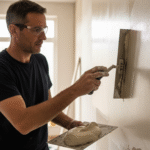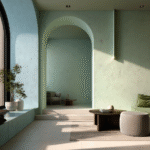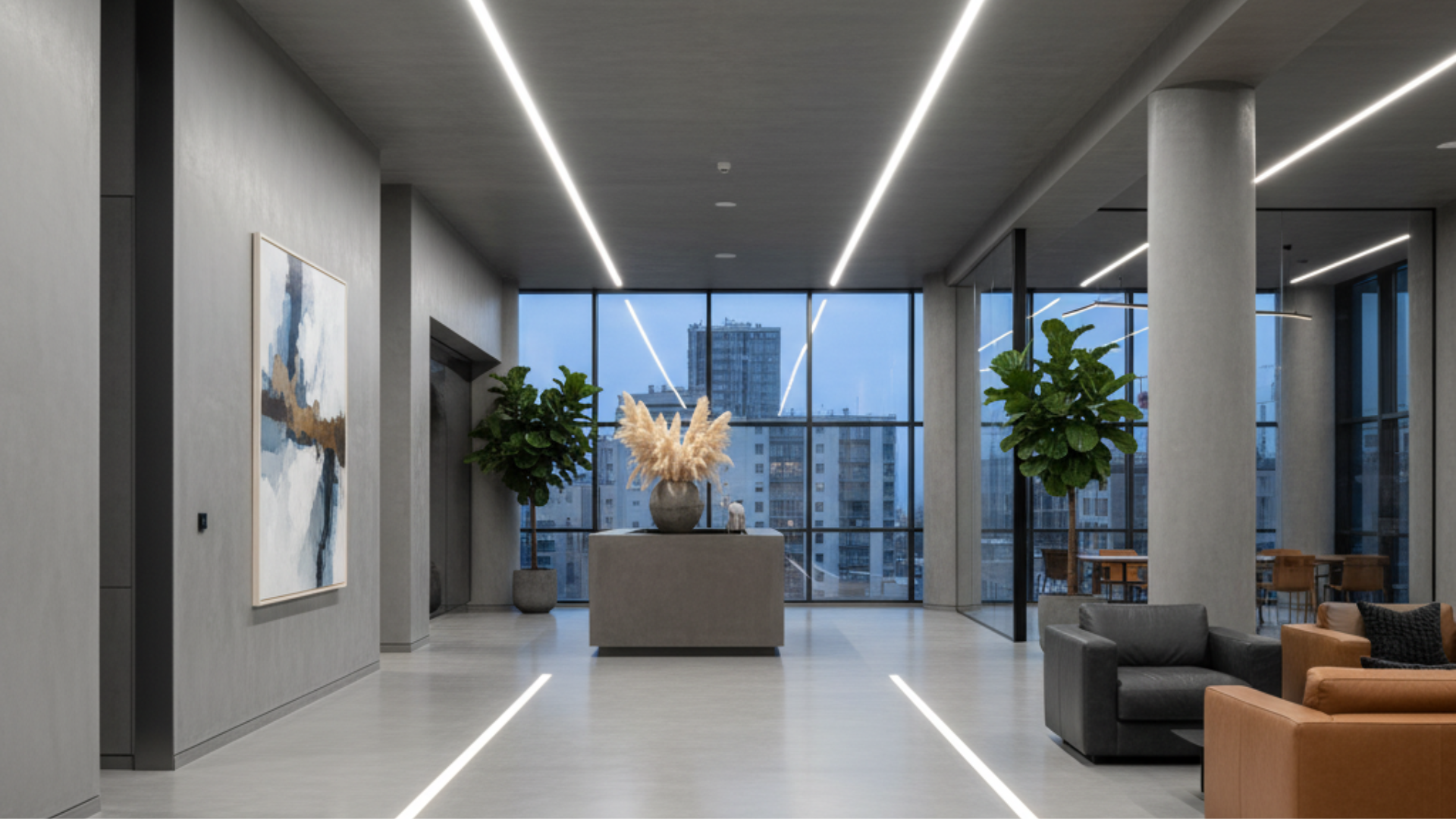Microcement Pricing Guide: How Much Is Microcement?
Microcement has rapidly become one of the most in-demand surface finishes in modern Canadian design, especially in cities like Toronto, Vancouver, and Montreal. Homeowners and designers alike are drawn to its seamless, sophisticated, and versatile appearance.
But one question always arises before installation: How much does microcement actually cost?
The truth is, microcement pricing in Canada varies depending on surface type, labour complexity, and the level of craftsmanship involved.
From sleek bathroom walls to contemporary kitchen countertops and luxury concrete-look floors, the cost of microcement can shift dramatically depending on the project’s requirements.
In this detailed guide, you’ll learn about the average price per square foot in Toronto, key cost factors, placement breakdowns, and how to choose the right professional installer to get the best results and value for your investment.
Let’s get right into it!
What Is The Average Microcement Cost In Canada?
Across Canada, the average cost of microcement ranges between $9 and $15 per square foot, or roughly $90 to $150 per square metre.
However, this price can increase depending on complexity, finish type, and labour rates in specific regions.
In Toronto, premium finishes or moisture-resistant applications (like in showers) can reach $16–$20 per square foot.
Cost Comparison (Per Square Foot):
| Surface Type | Average Cost (CAD) | Notes |
|---|---|---|
| Standard Floors | $9–$15 | Smooth matte finish |
| Walls | $9–$14 | Vertical surfaces cost slightly less material, more labour |
| Bathrooms | $10–$16 | Waterproofing & sealing add cost |
| Kitchen Countertops | $12–$20 | Heat & scratch-resistant topcoat |
| Stairs / Furniture | $8–$13 | Complex shapes require extra labour |
Source: Toronto-based contractor pricing data (2024), verified through industry averages and HomeStars listings.
Key Factors That Affect Microcement Pricing
Every microcement project is unique — and so is its cost. Here are the major factors influencing pricing:
Surface Preparation
Microcement requires a smooth, stable substrate. Removing old tiles, repairing cracks, or levelling uneven floors adds to the labour cost.
Substrate Type
Applying microcement over concrete is generally cheaper than over wood, MDF, or drywall, which may need reinforcement or priming.
Finish Type
High-gloss or polished effects demand more layers, trowelling, and sanding. Matte finishes cost slightly less.
Colour Customization
Custom pigments or artistic patterns increase costs due to pigment blending and multiple sample applications.
Area Size
Larger areas benefit from economies of scale — smaller spaces often cost more per square foot due to setup and prep.
Labour & Expertise
Toronto’s skilled applicators may charge higher labour rates, but their precision prevents costly future repairs.
Sealing & Protection
High-moisture zones (like bathrooms or kitchens) need waterproof sealers, which can raise material cost by 10–15%.
Microcement Flooring Cost
Microcement flooring has become a top alternative to polished concrete or tile floors in luxury condos, offices, and homes across Toronto.
- Average Cost: $10–$15 per square foot
- Durability: 15–25 years with proper care
- Installation Time: 3–5 days depending on area size
Microcement floors are seamless, easy to clean, and resistant to moisture — making them perfect for open-concept spaces.
Compared to polished concrete ($12–$20/sq. ft.) or tile ($8–$18/sq. ft.), microcement offers a modern look with less thickness and weight, which is ideal for condos and upper floors where structural load limits apply.
Microcement Wall Cost
Microcement walls are popular in living rooms, stairwells, and feature walls, offering a high-end texture that mimics natural stone or plaster.
- Average Cost: $9–$14 per square foot
- Benefits: Adds depth, texture, and a custom artistic finish
- Applications: Accent walls, fireplaces, lobbies, hallways
In Toronto, microcement feature walls are trending among boutique hotels, restaurants, and modern condos.
Tip: Request a small test panel before full application to ensure your desired colour and sheen match the lighting of your space.
Microcement Bathroom Cost
Bathrooms are where microcement truly shines — quite literally. Its seamless waterproof finish eliminates grout lines, reducing mould and mildew risks.
- Average Cost: $10–$16 per square foot
- Popular Applications: Showers, floors, walls, sinks, and bathtubs
- Waterproofing: Requires multiple sealer layers or epoxy topcoat
A typical Toronto bathroom (60 sq. ft.) may cost $1,200–$1,600 to fully microcement, depending on surface prep and design.
Bonus: properly sealed microcement can also be applied to wet-room style showers for that spa-like European aesthetic.
Microcement Kitchen Countertop And Backsplash Cost
Microcement is gaining popularity as a cost-effective alternative to quartz and granite countertops.
- Average Cost: $12–$20 per square foot
- Advantages: Heat resistant, easy to clean, food-safe sealers available
- Applications: Countertops, backsplashes, islands
For context, high-end quartz countertops in Toronto can exceed $120 per sq. ft., while microcement offers a comparable modern look for a fraction of the cost.
Maintenance is easy — just avoid harsh cleaners and re-seal every few years.
Microcement Stairs, Furniture, And Decorative Surfaces
Microcement’s versatility extends to furniture, fireplace surrounds, and stairs.
- Average Cost: $8–$13 per sq. ft.
- Features: Can be customized in texture, anti-slip finish, and colour
- Use Cases: Steps, built-in benches, dining tables, fireplace mantels
Because of their shape, stairs and curved furniture require more manual labour, which can increase the total project cost.
Maintenance And Longevity
Microcement is surprisingly low-maintenance if properly sealed.
- Cleaning: Use pH-neutral soap and microfibre mop.
- Re-sealing: Every 3–5 years for high-traffic or wet zones.
- Lifespan: 15–25 years with regular maintenance.
According to Remodeling Magazine’s Cost vs. Value Report, decorative coatings like microcement offer up to 70–80% ROI in resale value for modern homes — particularly in the Toronto condo market.
DIY vs Professional Installation
While some small decorative applications can be done DIY, large floors, walls, and bathrooms should always be left to professionals.
DIY risks include:
- Uneven layering
- Cracking due to poor substrate prep
- Improper sealing (leading to water infiltration)
Certified microcement contractors in Toronto typically use professional systems such as Topciment, Forcrete, or Cemher, all of which come with manufacturer training and warranties.
How To Hire The Right Microcement Contractor In Toronto
When hiring a microcement contractor, always:
- Ask for a portfolio of completed projects.
- Check Google or HomeStars reviews.
- Verify insurance and business licence.
- Request a written quote with material and labour breakdown.
- Ask about warranty and product brand.
- Compare quotes but don’t choose solely on price — experience and finish quality matter more.
Environmental And Sustainability Benefits
Microcement is considered a sustainable finishing option:
- Thin Application: 2–3 mm means less material usage.
- Low Waste: Can be applied over existing tile or concrete, reducing demolition debris.
- Low VOC: Modern sealers are water-based and eco-friendly.
- LEED Credits: Can contribute to sustainable building certifications.
For eco-conscious Toronto homeowners, microcement offers a sustainable alternative to full-scale concrete pours.
Conclusion
Microcement continues to be a favourite among Canadian designers and homeowners for its elegance, resilience, and versatility.
While average costs range from $9–$15 per square foot, the value lies in its seamless aesthetic, durability, and low maintenance.
If you’re considering a modern renovation in Toronto, investing in microcement is not only about style — it’s about long-term durability, property value, and sustainability.
Whether it’s a luxury condo bathroom or a high-end commercial space, hiring a qualified professional ensures the finish lasts beautifully for decades.
If you have any questions about our article “Microcement Pricing Guide: How Much Is Microcement?” or need microcement installation contact us at info@marcrete.ca or connect with us on Google My Business.
FAQs About Microcement Pricing And Installation
Is Microcement Expensive Compared To Tiles Or Concrete?
Not necessarily. Microcement often costs less than high-end tile or polished concrete because it requires less structural preparation and no grout lines.
Can Microcement Be Applied Over Existing Tile Or Surfaces?
Yes — that’s one of its main advantages. Proper surface preparation ensures adhesion and saves on demolition costs.
Is Microcement Waterproof?
When sealed correctly, microcement is fully waterproof and ideal for showers, bathrooms, and kitchen surfaces.
How Long Does Microcement Last?
With proper maintenance, microcement can last 15–25 years without losing its finish.
Does Microcement Crack Easily?
No — as long as the substrate is stable. Microcement is flexible and resists hairline cracks better than concrete.
Can Microcement Be Used Outdoors In Canada?
Yes, but it must be sealed with UV-resistant and frost-proof coatings to handle Canadian winters.
How Long Does Installation Take?
Most residential projects take 3–5 days, including prep, multiple layers, and drying time.
Is Microcement Eco-Friendly?
Yes, its thin layers, low waste, and VOC-free sealers make it a sustainable surface option.
Can I Customise The Colour Or Texture?
Absolutely — microcement offers an extensive palette of colours and finishes, from industrial greys to marble-like textures.
How Do I Maintain My Microcement Surfaces?
Use mild cleaners, avoid abrasives, and reapply sealant every few years. For scratches, a light polish or reseal typically restores the surface.







